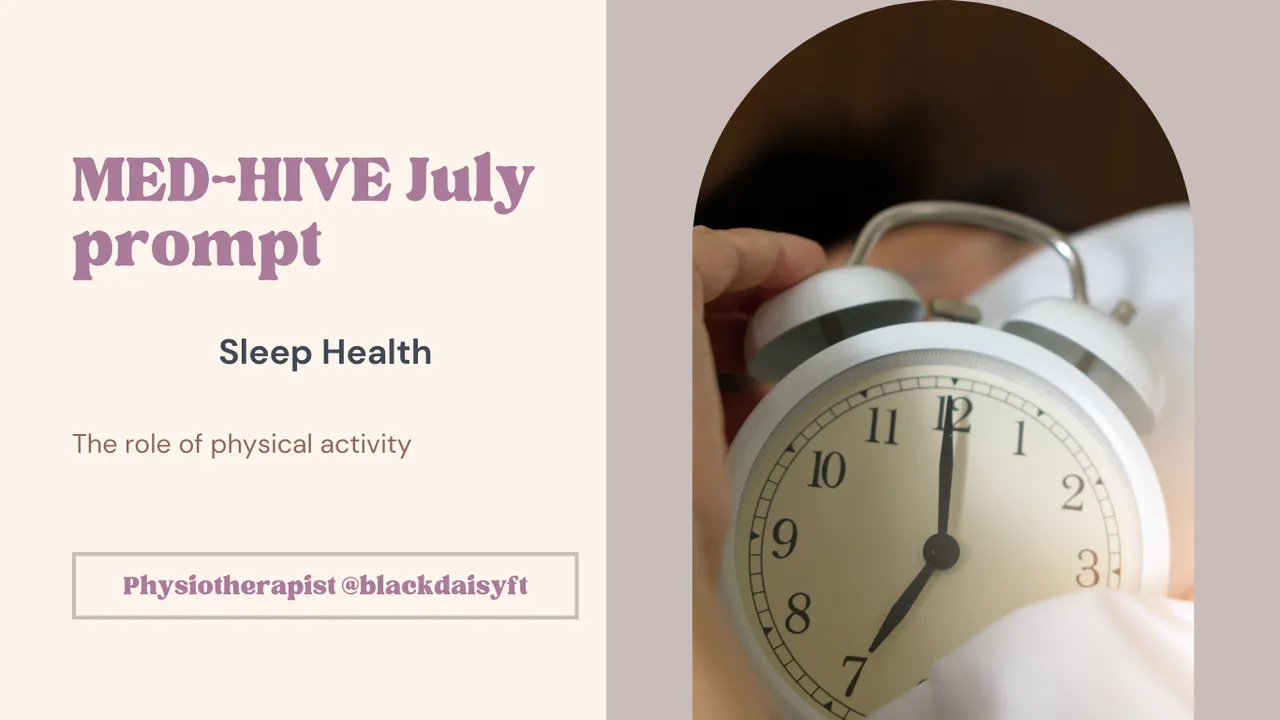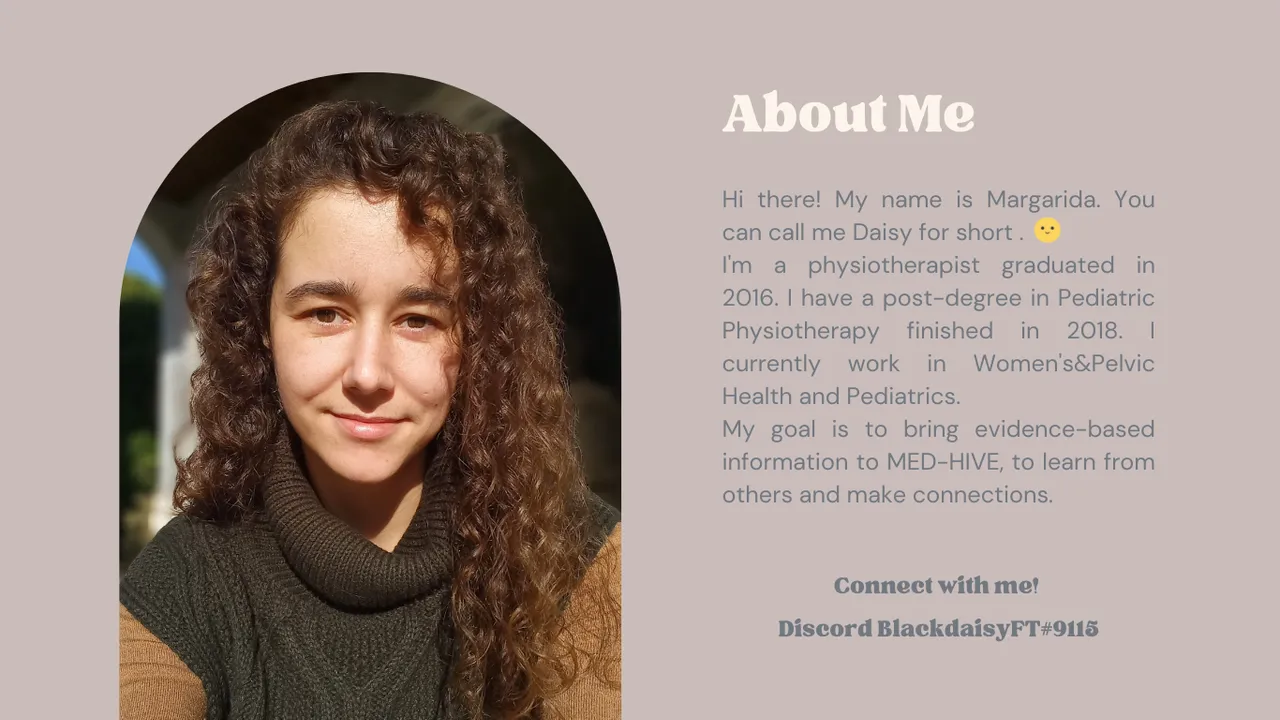

Greetings fellow colleagues 🤗
Greetings fellow med and non-med hivers 😊. I'm so excited to participate in another MED-HIVE community prompt 😍. It's been a while since posting health-related content but for excellent reasons 🤗. I now have the honour to be more actively involved in this wonderful community by being one of its moderators. However, 'with great powers comes great responsibilities - therefore I'm taking this role very seriously and I hope I can do a good job, hopefully, helping the community grow.
Getting back on track, this month's topic is about Sleep Health and as excepted, I couldn't let an opportunity like this go by without mentioning the importance and the role of physical activity in our health 😇.
Therefore, in today's post, I'll make my case and arguments once again around how physical activity can be a great tool in helping us deal with sleep disorders and achieve a healthier life 🤗. We will review two scientific articles that I researched and studied for the elaboration of this post. Additionally, I will finish by sharing a little of my personal experience with insomnia and, as always, leave a few tips and advice for the non-med hivers 😊.
Dear reader, care to join me?

Critical review and reflection 🤔
I think it's safe to say we all understand the importance of restoring and healthy sleep and how much it can impact our lives when we don't have a good night's rest! Whether we struggle to fall asleep, stay asleep or even have a few hours available to sleep, it deeply influences our mood, productivity and energy levels.
(...)sleep is a widely accepted key component of physiological restitution, essential for mental and physical health, and thus general well-being.
Sol Mochón‑Benguigui et al., 2021
Most of us, at some point in our lives, experienced either one or more of the struggles I mentioned. For instance, it can occur when we have a stressful event in our lives that keeps our minds in sentinel mode and therefore, makes it harder to fall asleep or we keep waking up during the night with ruminant thoughts 😲.
So, how can we define sleep health?
Accordingly to authors Andrew G. Kubala et al.,
Sleep health is a construct that emphasizes the multidimensional nature of sleep and can be defined as a pattern of sleep-wakefulness that promotes health and is impacted by environmental, social, and individual factors
Andrew G. Kubala et al., 2020.
And what are sleep disorders?
Accordingly to American Psychiatric Association,
Sleep disorders (or sleep-wake disorders) involve problems with the quality, timing, and amount of sleep, which result in daytime distress and impairment in functioning. Sleep-wake disorders often occur along with medical conditions or other mental health conditions, such as depression, anxiety, or cognitive disorders.
American Psychiatric Association
Sadly, and concerningly, sleep disorders are increasing at rapid speed, as Sol Mochón‑Benguigui et al. say,
the prevalence of sleep disorders in the overall population has dramatically increased in the last decade,
becoming an economic and clinical burden on the health system, with costs of up to $7494 million per year (Australia, 2004)
Sol Mochón‑Benguigui et al., 2021
Sleep disorders have a health impact far more extensive than our mood and productivity levels, even though they are essential aspects of our quality of life. The most common sleep disorders such as insomnia and obstructive sleep apnoea,
have been shown to be related to the development and worsening of a wide range of medical conditions such as obesity, type II diabetes mellitus, other cardio-metabolic alterations, chronic kidney disease, and anxiety and mood disturbances/depression, among others.
Sol Mochón‑Benguigui et al., 2021
The epidemiological and statistical numbers on sleep disorders are overwhelming and concerning,
Insomnia and obstructive sleep apnoea, are the most common sleep disorders with a prevalence of 10–40% and 9–38% in the overall population, respectively (...)
Sol Mochón‑Benguigui et al., 2021
About one-third of adults report some insomnia symptoms, 10-15% report problems with functioning during the daytime and 6-10% have symptoms severe enough to meet criteria for insomnia disorder. An estimated 40-50% of individuals with insomnia also have another mental disorder.
American Psychiatric Association
However, there is light in the end of the tunnel !
Physical activity has been consistently shown to be related to individual dimensions of sleep, including longer duration, greater depth, higher efficiency, and better daytime alertness.
Andrew G. Kubala et al., 2020.
increased physical activity may be highly effective at improving sleep quantity and quality, and thus an alternative treatment for sleep disorders/disturbances
Sol Mochón‑Benguigui et al., 2021
However, since we are critically reviewing scientific data, we have to be very careful about how we interpret the information in these articles. As I understood it, so far, the research on the relation between physical activity and sleep health has been of low to moderate quality. There are several biases and possible casual relations related to how we measure sleep quality/quantity and physical activity. Most of the science papers done so far have been focusing on subjective evaluation of sleep and self-reported physical activity which may not be the best way to make assumptions.
Nevertheless, the two articles on which I based this post are the ones I found that had at least a form of objective evaluation of physical activity levels through a pedometer and sleep partners on a 6-item RU_SATED questionnaire and accelerometry. However, a pedometer can't distinguish the differences between light, moderate and vigorous physical activities (PA), which can be of the utmost importance when we are trying to discover which type and level of PA have the most benefits if any at all.
According to Andrew G. Kubala et al.,
Overall, we found that greater levels of self-reported MVPA (moderate to vigorous physical activity) —but not LPA (low-intensity physical activity) or pedometer-based physical activity— were associated with better sleep health. (...)
(...) Our results also suggest a potential dose-response effect, as participants who engaged in ≥ 60 min/day of MVPA had better sleep health than those who reported < 30 min/day of MVPA.
(...) Greater amounts of physical activity have been shown to be associated with longer sleep duration on the following night, as well.
Andrew G. Kubala et al., 2020.
Nevertheless, it is undeniable that these two authors' findings
has significant implications for research and clinical practice. Consistent with past research, we
demonstrated that physical activity, cardiorespiratory fitness and muscular strength, although unrelated to sleep quantity, have a beneficial effect on sleep quality in healthy sedentary middle-aged adults, as well as sedentariness having a negative impact on sleep-related parameters.
Sol Mochón‑Benguigui et al., 2021
Lastly, a final note from Sol Mochón‑Benguigui et al.,
Regarding the sample, our study only included healthy sedentary middle-aged adults, so generalization of results to a wider population may not be possible.
More research in the area is needed, although I will always advocate how impactful and useful physical activity can be in our lives, even if we don't suffer from any condition, it will always be beneficial.

My advice and experience for non-med members 🙌
Speaking from experience, insomnia can be destructive and have a deep impact on our quality of life. When I was in college, I experienced 5 full days without being able to sleep. I would spend the whole night staring at the dark, tired and not able to fall asleep. I tried teas, herbs, counting little lambs, everything I could think of at the time, with the health knowledge I had. During the day I would drag myself to class and wasn't able to pay attention or learn anything.
Let me tell you, I do not wish this to my worst enemy! At the time, I was involved in a toxic relationship that was destroying me alongside exams trials and finishing my physiotherapy degree. So, my anxiety levels were pretty high at the time and didn't have the emotional badge or tools to help me cope. Even to this day, from time to time, when my anxiety levels or emotional state is worse I struggle to fall asleep, sometimes taking me hours.
However, there is a special exercise that works really well for me and wanted to share it with you! No scientific data is supporting my statement here but I do believe it can help someone out there, so I thought it was important to share it. My special trick is...
Deep Breathing
Just as simple as that, deep breathing helps me lower my anxiety levels, therefore I can fall asleep more easily. Of course, there are several other proven approaches to help improve the quality of sleep and you can read more about them here.
Dear reader, if you suffer from insomnia or struggle to fall asleep I strongly suggest you try this breathing deeply technique and see for yourself if it works for you 😊. If you're not sure how to do it, I already did an extensive guide about deep breathing that I hope will help fellow hivers out there.
A guide for breathing | The importance of our diaphragm muscle

Final notes 💭
That's it from me today! I really hope you learn something today while enjoying reading through 😊.
I look forward to learn from all of you as well, so please share your experience or your questions with me so we can achieve healthier lives 🤗.

References:

My previous health-related posts:
